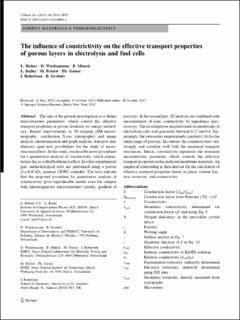Please use this identifier to cite or link to this item:
https://doi.org/10.21256/zhaw-1568| Publication type: | Article in scientific journal |
| Type of review: | Peer review (publication) |
| Title: | The influence of constrictivity on the effective transport properties of porous layers in electrolysis and fuel cells |
| Authors: | Holzer, Lorenz Wiedenmann, Daniel Münch, Beat Keller, Lukas Prestat, Michel Gasser, Philippe Robertson, Iain Grobéty, Bernard |
| DOI: | 10.21256/zhaw-1568 10.1007/s10853-012-6968-z |
| Published in: | Journal of Materials Science |
| Volume(Issue): | 48 |
| Issue: | 7 |
| Page(s): | 2934 |
| Pages to: | 2952 |
| Issue Date: | 2013 |
| Publisher / Ed. Institution: | Springer |
| ISSN: | 0022-2461 |
| Language: | English |
| Subjects: | Map |
| Subject (DDC): | 621.3: Electrical, communications, control engineering |
| Abstract: | The aim of the present investigation is to define microstructure parameters, which control the effective transport properties in porous materials for energy technology. Recent improvements in 3D-imaging (FIB-nanotomography, synchrotron X-ray tomography) and image analysis (skeletonization and graph analysis, transport simulations) open new possibilities for the study of microstructure effects. In this study, we describe novel procedures for a quantitative analysis of constrictivity, which characterizes the so-called bottleneck effect. In a first experimental part, methodological tests are performed using a porous (La,Sr)CoO3 material (SOFC cathode). The tests indicate that the proposed procedure for quantitative analysis of constrictivity gives reproducible results even for samples with inhomogeneous microstructures (cracks, gradient of porosity). In the second part, 3D analyses are combined with measurements of ionic conductivity by impedance spectroscopy. The investigations are preformed on membranes of electrolysis cells with porosities between 0.27 and 0.8. Surprisingly, the tortuosities remain nearly constant (1.6) for the entire range of porosity. In contrast, the constrictivities vary strongly and correlate well with the measured transport resistances. Hence, constrictivity represents the dominant microstructure parameter, which controls the effective transport properties in the analysed membrane materials. An empirical relationship is then derived for the calculation of effective transport properties based on phase volume fraction, tortuosity, and constrictivity. |
| URI: | https://digitalcollection.zhaw.ch/handle/11475/2124 |
| Fulltext version: | Published version |
| License (according to publishing contract): | Licence according to publishing contract |
| Restricted until: | 2019-01-01 |
| Departement: | School of Engineering |
| Organisational Unit: | Institute of Computational Physics (ICP) |
| Appears in collections: | Publikationen School of Engineering |
Files in This Item:
| File | Description | Size | Format | |
|---|---|---|---|---|
| 2013_Holzer_The influence of constrictivity_Journal of Materials Science.pdf | 1.63 MB | Adobe PDF |  View/Open |
Show full item record
Holzer, L., Wiedenmann, D., Münch, B., Keller, L., Prestat, M., Gasser, P., Robertson, I., & Grobéty, B. (2013). The influence of constrictivity on the effective transport properties of porous layers in electrolysis and fuel cells. Journal of Materials Science, 48(7), 2934–2952. https://doi.org/10.21256/zhaw-1568
Holzer, L. et al. (2013) ‘The influence of constrictivity on the effective transport properties of porous layers in electrolysis and fuel cells’, Journal of Materials Science, 48(7), pp. 2934–2952. Available at: https://doi.org/10.21256/zhaw-1568.
L. Holzer et al., “The influence of constrictivity on the effective transport properties of porous layers in electrolysis and fuel cells,” Journal of Materials Science, vol. 48, no. 7, pp. 2934–2952, 2013, doi: 10.21256/zhaw-1568.
HOLZER, Lorenz, Daniel WIEDENMANN, Beat MÜNCH, Lukas KELLER, Michel PRESTAT, Philippe GASSER, Iain ROBERTSON und Bernard GROBÉTY, 2013. The influence of constrictivity on the effective transport properties of porous layers in electrolysis and fuel cells. Journal of Materials Science. 2013. Bd. 48, Nr. 7, S. 2934–2952. DOI 10.21256/zhaw-1568
Holzer, Lorenz, Daniel Wiedenmann, Beat Münch, Lukas Keller, Michel Prestat, Philippe Gasser, Iain Robertson, and Bernard Grobéty. 2013. “The Influence of Constrictivity on the Effective Transport Properties of Porous Layers in Electrolysis and Fuel Cells.” Journal of Materials Science 48 (7): 2934–52. https://doi.org/10.21256/zhaw-1568.
Holzer, Lorenz, et al. “The Influence of Constrictivity on the Effective Transport Properties of Porous Layers in Electrolysis and Fuel Cells.” Journal of Materials Science, vol. 48, no. 7, 2013, pp. 2934–52, https://doi.org/10.21256/zhaw-1568.
Items in DSpace are protected by copyright, with all rights reserved, unless otherwise indicated.